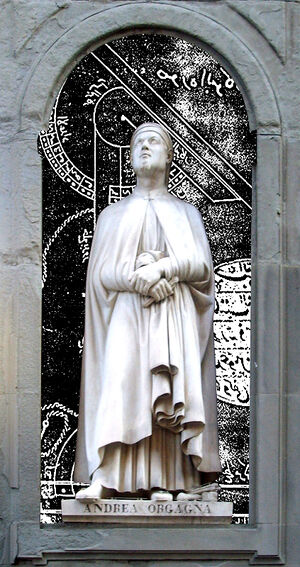Orcagna scrying engine: Difference between revisions
No edit summary |
No edit summary |
||
| (13 intermediate revisions by the same user not shown) | |||
| Line 1: | Line 1: | ||
[[File:Orcagna_scrying_engine.jpg|thumb|The Orcagna scrying engine in operation.]]The '''Orcagna scrying engine''' is a well-known [[scrying engine]] built into the statue of Andrea Orcagna at Uffizi in Florence. | [[File:Orcagna_scrying_engine.jpg|thumb|The Orcagna scrying engine in operation, downloading [[Abū Sahl al-Qūhī (nonfiction)|Abū Sahl al-Qūhī]]'s [[Perfect Compass]] protocol.]]The '''Orcagna scrying engine''' is a well-known [[scrying engine]] built into the statue of [[Orcagna (nonfiction)|Andrea Orcagna]] at Uffizi in Florence. | ||
On November 16, 1838, the Orcagna scrying engine, under contract to [[House of Malevecchio]], downloaded an unprecedentedly high-resolution version of [[Abū Sahl al-Qūhī (nonfiction)|Abū Sahl al-Qūhī]]'s [[Perfect Compass]] protocol. [[House of Malevecchio|Malevecchio]] attempted to monopolize the high-resolution version of the protocol, but within five years the French, having reverse-engineered earlier translations of [[Abū Sahl al-Qūhī (nonfiction)|Abū Sahl al-Qūhī]]'s work, announced ''Le Compas Parfait''. Within fifty years, all of Christendom had similar systems. This period has sometimes been called the Second Renaissance, a kind of transdimensional counterpart of the Enlightenment. | |||
== In the News == | == In the News == | ||
<gallery> | <gallery> | ||
File:Orcagna Uffizi.jpg|link=Orcagna (nonfiction)|September 16, 1839: Spokesman for the Uffizi scoffs at the notion of "[[scrying engines]]", declares that "[[Orcagna (nonfiction)|Andrea Orcagna]] is many things -- painter, sculptor, architect -- but he is not the sorcerer you describe." | |||
File:Abū Sahl al-Qūhī Perfect Compass.jpg|link=Abū Sahl al-Qūhī (nonfiction)|989: Mathematician, physicist, and astronomer [[Abū Sahl al-Qūhī (nonfiction)|Abū Sahl al-Qūhī]] declares that he too is "not the sorcerer you describe." | |||
</gallery> | </gallery> | ||
| Line 10: | Line 14: | ||
* [[Gnomon algorithm]] | * [[Gnomon algorithm]] | ||
* [[Gnomon Chronicles]] | * [[Gnomon Chronicles]] | ||
* [[House of Malevecchio]] | |||
* [[Perfect Compass]] | |||
* [[Scrying engine]] | * [[Scrying engine]] | ||
== Nonfiction cross-reference == | == Nonfiction cross-reference == | ||
* [[Abū Sahl al-Qūhī (nonfiction)]] | |||
* [[Engine (nonfiction)]] | * [[Engine (nonfiction)]] | ||
* [[Orcagna (nonfiction)]] | |||
* [[Scrying (nonfiction)]] | * [[Scrying (nonfiction)]] | ||
[[Category:Fiction (nonfiction)]] | [[Category:Fiction (nonfiction)]] | ||
[[Category:Scrying engines (nonfiction)]] | [[Category:Scrying engines (nonfiction)]] | ||
Latest revision as of 18:50, 15 September 2018
The Orcagna scrying engine is a well-known scrying engine built into the statue of Andrea Orcagna at Uffizi in Florence.
On November 16, 1838, the Orcagna scrying engine, under contract to House of Malevecchio, downloaded an unprecedentedly high-resolution version of Abū Sahl al-Qūhī's Perfect Compass protocol. Malevecchio attempted to monopolize the high-resolution version of the protocol, but within five years the French, having reverse-engineered earlier translations of Abū Sahl al-Qūhī's work, announced Le Compas Parfait. Within fifty years, all of Christendom had similar systems. This period has sometimes been called the Second Renaissance, a kind of transdimensional counterpart of the Enlightenment.
In the News
September 16, 1839: Spokesman for the Uffizi scoffs at the notion of "scrying engines", declares that "Andrea Orcagna is many things -- painter, sculptor, architect -- but he is not the sorcerer you describe."
989: Mathematician, physicist, and astronomer Abū Sahl al-Qūhī declares that he too is "not the sorcerer you describe."


